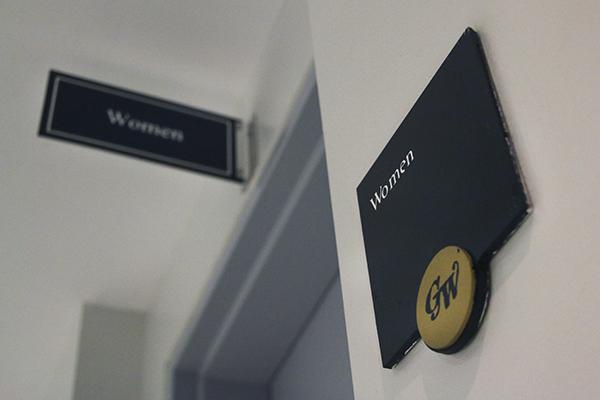Bathrooms can be uncomfortable places.
But Gabriel Schirvar, a senior who identifies as genderqueer and prefers they/them pronouns, said they feel especially ill at ease in public bathrooms.
“As somebody who tends to be more fluid in my gender presentation, I feel like I’m almost making a decision about my gender every time I’m choosing between bathroom doors,” Schirvar said. “That’s not what I want to be doing when I’m trying to go to the bathroom.”
Facilities Services began working with the D.C. Office of Human Rights in early February, and will label an additional 82 single-occupancy bathrooms on campus as simply “restroom,” rather than “men” or “women” starting with the Marvin Center on Monday. The move follows a citywide Safe Bathrooms campaign to make more public bathrooms universally accessible.
For GW’s Gender Inclusive Bathroom Week, which starts Monday, “Toilet Trainers” will be stationed across campus to spread awareness of issues like gender inclusion. Several student organizations on campus – including the Student Association, the Association of Queer Women and Allies and Allied in Pride – helped organize the program.
The week will include events like a “Square 80 ‘Shit In,’” where students can join Bathroom Week representatives to ask questions and address concerns about gender inclusivity on campus.
Schirvar, who is double-majoring in international affairs and French, said they have sometimes struggled to find a safe space in public restrooms on campus.
“Everybody deserves to be free to pee,” Schirvar said. “Sometimes I get weird looks going into the women’s bathroom. But then I don’t pass as masculine enough to go into the men’s bathroom.”
When the University decided to incorporate all-gender bathrooms more widely across campus this semester, Schirvar said they were glad GW recognized its large LGBT population.
“There’s been a lot of administrative support for the implementation of all-gender bathrooms, and that’s been amazing to see,” Schirvar said.
Two years ago, the University announced that new campus buildings, including the Science and Engineering Hall and the Milken Institute School of Public Health building, would come equipped with gender-neutral bathrooms.
Stephen Forsell, the founding director of the graduate program in LGBT health policy and practice, said students should also take advantage of the week to recognize issues that LGBT individuals can face such as harassment and hate crimes.
“This is just something we can do and should do over time to make people feel comfortable in a large gender-segregated bathroom environment,” he said.
Daniel Moshenberg, the director of the women’s studies program, said supporting the LGBT community is “everyone’s issue” and that the week’s events could help students see gender differently.
“It allows people to be thinking more critically about the intersection of personal space, public space and public policy,” Moshenberg said. “Anything that gets us to act in a more informed manner about gender as a construction is always a good thing.”







